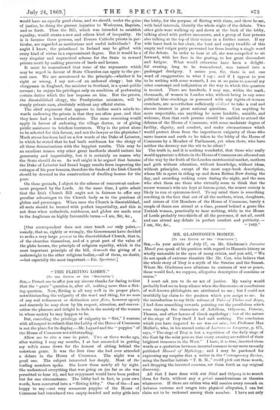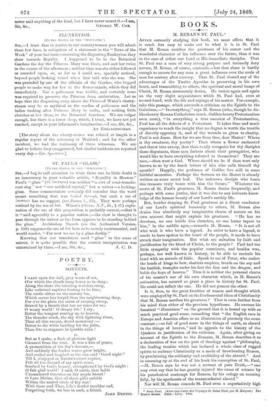MR. GLADSTONE'S HOMER.
[TO THE EDITOR OF THE SPECTATOR.1
S111,—In your article of July 17, on Mr. Gladstone's Javentus Mundi you speak of his position with regard to Homeric history as wholly untenable in the eyes of many critics, and you add, "We do not speak of extreme theorists like Mr. Cox, who believe that the whole story of Troy is a myth of the Sunrise and the Sunset. Where Mr. Gladstone sees allusions to customs of war or peace, these would find, we suppose, allegories descriptive of sunshine or storm."
I must ask you to do an act of justice. My vanity would probably lead me to keep silence when the discoveries or conclusions of well-known philologists are attributed to me ; but I could not truthfully lay claim to the position which you assign to me. In the introduction to my little volume of Tales of Thebes and Argos, I had done something towards pointing out the parallelism which runs through the characters of Achilleus, Odysseus, Perseus, Theseus, and other heroes of Greek mythology ; but of the nature of the siege of Troy itself I had said nothing. The conclusion which you have imputed to ine was not mine, lett l'rofessor Max Muller's, who, in his second series of Lectures on Language, p. 471, says, "The siege of Troy is but a repetition of the daily siege of the East by the solar powers that every evening are robbed of their brightest treasures in the Vest." I have, it is true, inserted these words as a quotation between inverted commits in my more recently published Manual of Mythology; and I may be pardoned for expressing my surprise that a writer in the Contemporary Review, using the familiar initials "1'. B. M.," could pick out these words, and dropping the inverted commas, set them forth as my original discovery.
All that I have done with our Iliad and Odyssey is to search them for facts, without any a priori considerations or theories whatsoever. If there are critics who will resolve every remark on Achaian customs and usages into physical allegories, I can but claim not to be reckoned among their number. I have not only never said anything of the kind, but I have never meant it.—I am,































 Previous page
Previous page